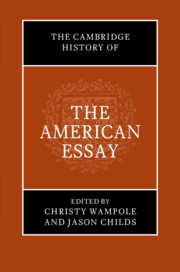Book contents
- The Cambridge History of the American Essay
- The Cambridge History of the American Essay
- Copyright page
- Contents
- Acknowledgments
- Notes on Contributors
- Introduction
- Part I The Emergence of the American Essay (1710–1865)
- Part II Voicing the American Experiment (1865–1945)
- 9 Writing Freedom before and after Emancipation
- 10 Social Justice and the American Essay
- 11 “Zones of Contention” in the Genteel Essay
- 12 The American Comic Essay
- 13 Nineteenth-Century American Travel Essays: Aesthetics, Modernity, and National Identity
- 14 American Pragmatism: An Essayistic Conception of Truth
- 15 The Essay in the Harlem Renaissance
- 16 The Southern Agrarians and the New Criticism
- 17 Subjective and Objective: Newspaper Columns
- 18 The Experience of Art: The Essay in Visual Culture
- 19 The Essay in American Music
- Part III Postwar Essays and Essayism (1945–2000)
- Part IV Toward the Contemporary American Essay (2000–2020)
- Recommendations for Further Reading
- Index
9 - Writing Freedom before and after Emancipation
from Part II - Voicing the American Experiment (1865–1945)
Published online by Cambridge University Press: 28 March 2024
- The Cambridge History of the American Essay
- The Cambridge History of the American Essay
- Copyright page
- Contents
- Acknowledgments
- Notes on Contributors
- Introduction
- Part I The Emergence of the American Essay (1710–1865)
- Part II Voicing the American Experiment (1865–1945)
- 9 Writing Freedom before and after Emancipation
- 10 Social Justice and the American Essay
- 11 “Zones of Contention” in the Genteel Essay
- 12 The American Comic Essay
- 13 Nineteenth-Century American Travel Essays: Aesthetics, Modernity, and National Identity
- 14 American Pragmatism: An Essayistic Conception of Truth
- 15 The Essay in the Harlem Renaissance
- 16 The Southern Agrarians and the New Criticism
- 17 Subjective and Objective: Newspaper Columns
- 18 The Experience of Art: The Essay in Visual Culture
- 19 The Essay in American Music
- Part III Postwar Essays and Essayism (1945–2000)
- Part IV Toward the Contemporary American Essay (2000–2020)
- Recommendations for Further Reading
- Index
Summary
This chapter analyzes Black writing from the leadup to the Civil War to the end of the nineteenth century, works that shored up the literate voice long denied to enslaved people, and explores how the pre-emancipation essay served to determine freedom. The century’s standout Black orator, Frederick Douglass, became a print phenomenon, advancing a strong first-person voice that spoke for the conscience of the nation. However, it was left to younger writers to tackle the meaning of freedom at a time when emancipation seemed like a hollow promise. The works of activist journalist Ida B. Wells highlight the synergy between investigative reporting and essay writing during the period. The chapter concludes by comparing the prose works of two towering figures: Booker T. Washington and W. E. B. Du Bois. The ideological split in their views on civil rights is registered in their different writing styles, with Washington stressing action and advocacy and Du Bois embracing introspection and contemplation. Between them, these figures register the suite of oratorical, journalistic, and literary resources that will be bequeathed to twentieth-century practitioners of the African American essay.
Keywords
- Type
- Chapter
- Information
- The Cambridge History of the American Essay , pp. 149 - 165Publisher: Cambridge University PressPrint publication year: 2023



